- Home
- Michael Crichton
Odds On: A Novel Page 22
Odds On: A Novel Read online
Page 22
He sprinted down the hall. Behind him, Bryan staggered to his feet and called, “I’m coming.”
Jencks rounded the corner and followed the sound of footsteps up the broad, circular stair. Up to the third floor, then the fourth. Above him, he continued to hear running feet. The fifth floor. Still the feet. Jean-Paul was going to the roof.
As he reached the top floor. Jencks heard a door slam. Jean-Paul would be outside now, hiding somewhere on the flat, broad roof of the hotel, a surface which was unbroken except for a half-dozen chimneys and ventilator shafts. He came to the door and looked through the small square window.
The roof was covered in black tar paper and gravel; heat waves shimmered up, blurring the shapes of the white rectangles that pierced the roof at various places. He did not see his man.
Jencks hesitated. Was Jean-Paul armed? It seemed unlikely, but you could never be sure. Jencks himself had only a penknife, and it was hardly a serviceable weapon. One flight below, he heard Bryan approaching. He looked down the stairwell, and saw the black-and-white checked floor of the lobby, five floors down. Nobody in sight; apparently running men did not attract much attention. Perhaps the staff had too many other things to worry about.
Bryan arrived puffing. “Is he out there?”
“Yes. There’s no other way for him to get down. This is the only door.”
“Then we’ve got him,” Bryan said. He looked out the window. “Any idea where he is?”
“No. I’m going out there, to see if I can flush him out. You stay here—he isn’t expecting you—and make sure he doesn’t get by.” Jencks frowned. “Be as rough as you want. He won’t be holding back any punches.”
Bryan nodded. Jencks opened the door and walked out to the roof. He shut the door behind him.
The first thing he noticed was the wind, which was strong and gusty, blowing over his face, rippling his clothes. Then he felt the noonday sun, hot on the back of his neck. Except for the wind and the dim whirr of a generator, it was very quiet. His feet crunched on the gravel. He bent down and slipped off his shoes. When he stepped forward on stocking feet, he made less noise but his footsteps were still far from silent. He moved toward the first chimney.
It was a broad, white rectangle, larger than a home refrigerator, and afforded plenty of protection for a man. He moved close and worked his way around to the far side.
Nobody there.
Breathing a deep sigh, fought back his tension. He had to stay cool. He went to the next chimney. This one was silently belching black smoke. Half-crouched, he walked around it
Nobody there.
He was going for the third chimney when he heard a grunt behind him. Looking back, he saw Jean-Paul struggling with Bryan at the door. He ran to them just as the Frenchman delivered a telling blow to Bryan’s jaw. For a moment, Jencks feared Jean-Paul would escape again. But then Miguel was blocking the passage, throwing two quick jabs at Jean-Paul’s nose. Jean-Paul’s head jerked back twice.
Jean-Paul toppled, rolled onto his stomach, and scrambled to his feet He ran straight into Jencks, who hit him very hard. Jean-Paul sank to the ground, gasping. Blood ran from his nose and mouth; one eye was already swollen and closed. Jencks grabbed his hair, hauled his head up, and looked into the exhausted face.
“It’s a long drop off this roof,” Jencks said conversationally. “Come and see.”
He dragged Jean-Paul by the collar to the edge of the tar paper and held his head over the side. Together, they stared down one hundred feet to the blue, clear rectangle of the pool. It said “Hotel Reina” on the bottom, in black tile. Nobody was swimming; various people were seated around the water, just as they had been when Jencks, Bryan, and Miguel had gone to Cynthia’s room.
“Care to take a plunge? You’re all hot and sweaty.” Jencks pushed the limp body forward. “Do you a world of good.”
Jean-Paul, still gasping for breath, looked down, then up at Jencks. He hesitated. Jencks pushed him further.
“All right,” Jean-Paul said. “I’ll tell you. Get me back.”
Jencks did not move. “I don’t believe you, and I find you tiresome.”
Closer to the edge.
“Jesus! I’ll tell you. You’ve got to believe me.” The face was now white, the eyes wide with fear.
With apparent reluctance, Jencks hauled him away from the edge.
“The man is named Brady. He has the money. He—”
Roughly, Jencks dragged him back to the edge of the roof. “Not very good,” he said. “You’ll have to do much better than that.” He slammed Jean-Paul’s chin down on the concrete lip, then pulled it back. “Try again.”
“Miss Shaw,” Jean-Paul said, blood running down his chin. “It was Miss Shaw. She planned the whole thing.”
In sudden anger, Jencks punched him again and shoved him aside. He looked down at the pool. Of course! It was brilliant, truly inspired! Brady and Cynthia scouted, Jean-Paul did the dirty work, and the mastermind sat quietly by, selling dope and eating bananas.
As he watched, he picked out the little bundle that was Miss Shaw, seated next to a table strewn with banana peels. A waiter came up to her bearing a message on a silver tray. Miss Shaw took the message, read it, and looked quickly around. Then she got out of her chair and bustled inside.
It was time to get moving.
He ran back to the door, grabbing his shoes as he went. The gravel cut into his feet, but he didn’t care.
Miguel was helping Bryan up. “Find out?”
“I’ll say. You won’t believe it. The person who planned it all was Miss Shaw.”
“Miss Shaw!”
Jencks nodded. “Take care of Bryan. I’ll handle grandma myself.”
“Want the gun?” Miguel held it out.
“No. I won’t need it.”
He ran downstairs.
It made sense, he thought, at least in retrospect. This project required brains, the kind of brains that Brady didn’t have and Jean-Paul could never aspire to. It required planning and coolness that had to come from someone else. Miss Shaw was perfect. He remembered how cunningly she had delved into his background, as she played the amusing, eccentric English maiden aunt. He should have suspected at the time. No characterization that perfect could be genuine.
She was a fox.
He reached the third floor and ran to her room. He inserted the correct key into the lock and flung the door wide. Miss Shaw was standing in front of him, relaxed and calm. In one hand, she held a small suitcase.
In the other hand, she held a gun.
AFTERNOON, JUNE TWENTY-SECOND
“YOUNG MAN, I MUST tell you that you are very impertinent.”
“Cut it out,” Jencks said.
“Are you a policeman?”
“No.” He looked at the gun. Somehow, he had to distract her, to make her look away. But the gun was fixed on him; her grip was steady. There were no tremors, no quaverings of age. Miss Shaw was in her element now, with a silver-plated pistol in her dainty, wrinkled fingers.
“One of us, are you?” Her eyebrows went up. “Fancy that. I would never have expected it, here of all places. The hotel clientele is usually so reliable. This really is quite a surprise. Would you be terribly hurt if I asked you to step into the bathroom?”
Silently, he did as he was told.
“That’s my man. It was so sweet of Cynthia to send a message down to me, after you and your friends … visited her. She’s a loyal girl, a real dear. I’m going to leave you now and lock the hall door behind me. I really would rather you didn’t come bursting out of the bath while I’m locking up. I’m not young and I’m easily startled. Do we understand each other?”
“Perfectly.” Jencks suppressed a smile. Here, at last, was one place where his superior preparation and planning paid off. Obviously Miss Shaw did not know that doors locked from the outside could be opened from the inside merely by turning the knob.
“I’ll just trot downstairs to the desk and announce that I found a man i
n my room, searching it. Soon enough, the guests will all discover that they’ve been robbed—and who’s to blame? That villainous fellow they caught in Miss Shaw’s room. You’ll have a devil of a time with the police, I can tell you. They’re downright nasty, I hear.”
Jencks tried to look furious.
“Do shut the door, like a decent chap. Very nice of you. Good day, Mr. Jencks.”
He waited until he heard the key turn in the lock and then stepped out into the bedroom. She had rumpled the room, leaving clothes scattered and drawers ajar before going. That was a nice touch; Jencks felt a certain kinship with this woman. He would have done the same, in her place. He frowned—he would also have left the gun as incriminating evidence. Looking across the room, he saw it placed discreetly on the dresser. Tricky old fox! He listened at the door to her retreating footsteps, then opened it.
She was heading for the stairs. He chased after her and caught up with her halfway between the second and third floor. She seemed surprised but not at all upset; she raised the umbrella she was carrying like a rapier and jabbed at him with it.
The tip, silver and sharp, glinted in the sun which streamed down from the skylight. He edged forward; she drove him back with darting lunges, always keeping her umbrella between himself and her suitcase full of jewels. Her jowls quivered with exertion, but she did not drop her guard. Once she hissed, “You really are an impossible man,” but otherwise their struggle was conducted in silence.
Up and down the broad marble stairs they moved, he attacking, she repelling him. His eyes remained fixed on the point of the umbrella. It was sharp enough to go right through his stomach. She moved it expertly, flicking back and forth, always controlled, always balanced. Soon he was sweating, tired; at length he stopped and leaned against the bannister.
“I suppose you have that tipped with some South American poison?”
“Dear boy, your imagination is simply incredible.”
The battle was resumed. She forced him back by slow degrees; he recovered and began to drive her back. They seesawed back and forth for several more minutes, until finally he caught her off guard. He slapped the umbrella aside and threw himself on her. She really was a light and wispy thing, despite her dumpling appearance, and she fell easily. As she did, she flung the suitcase over the stair-rail.
Horrified, Jencks released her and looked down.
She scrambled to her feet and watched alongside him.
The suitcase fell.
It seemed to move slowly at first, gathering speed as it went.
“Oh dear,” she said.
It hit the marble floor with a crash and sprang open, its collection of necklaces, rings, cash, traveler’s checks and watches spilling out. They rolled, clattered and bounced across the black-and-white surface.
Jencks stepped back from the railing, unable to look any longer.
“You’re white as a ghost, young man,” Miss Shaw said.
“How could you do it?”
“Oh, nonsense. I won’t listen to such rot. Come along with me, and we’ll have a nice spot of banana liqueur.”
“I would have split it with you, divided it in some way.…”
“Be careful,” she said, slipping her arm in his. “You’ll become overexcited.”
Together, they descended to the bar. Jencks went along unsteady and silent; he no longer knew where he was or what he was doing.
“Cheer up,” Miss Shaw said, patting, his arm in a motherly way. “You’ve had a bit of a shock, that’s all. When one gets to be my age, one learns to take these things with aplomb—and a glass or two. You’ll feel better in a jiffy, I assure you.”
Annette stared dumbfounded at the floor. It made no sense at all; it was beyond comprehension. People were gathering to see what the noise had been; she heard a crunch and looked over to see an embarrassed man remove his foot from what had once been a watch. Now there was shouting. The house detectives arrived, pushing people back, clearing away the space beneath the stairs. Several guests who were trying to pocket diamond rings had their hands slapped.
Slowly, it came to her. The hotel had been robbed. It didn’t seem possible—there had been no complaints, not even a rumor—and yet there was the evidence, all over the floor.
Mr. Bonnard hurried up, in great agitation. His eyes were bulging, his lips trembled. “There’s been a robbery!” he said. “Why wasn’t I informed?”
Annette ignored the question. “Have you checked the hotel safe?”
“Oh my God. Oh. The safe. No.” He scurried off again, back to his office. She came around the desk and tiptoed among the jewels to the guests and began asking them to please return to the dining room, that everything was under control, that there was no problem at all. With her back to the glittering mass, she felt ridiculous.
“That’s my ring,” shrieked a woman. “I know it. My ring! I’ve been robbed. Give me my ring back. Give it back.”
The hotel detectives pushed, firmly. The crowd did not yield.
“Robbery! Robbery!” The shout was now nearly a chant.
Mr. Bonnard came up again. “Robbed,” he said, in an awed voice. “Cleaned out. We’ve been robbed!”
“Better make a speech,” Annette advised. “You’re the manager.”
Mr. Bonnard nodded, swallowed, and stepped back. He clapped his hands for silence.
“My friends, please—”
“Robbery! Thieves!”
A man’s voice said, not loud but very distinctly, “I knew we shouldn’t have come to Spain, Harriet.”
“Please, please,” Mr. Bonnard begged, holding up his hands.
A resentful silence fell over the crowd.
“I must beg you to return to the dining room. There has been a robbery of the hotel, but the material has apparently been—ah—returned. These gentlemen restraining you are the house detectives, and I can assure you that we of the staff have this situation firmly in hand.” His face, he knew, betrayed him, but he continued on. “The police are due to arrive at any minute. They will deal with the recovery of this material, upon suitable identification of ownership. In the meantime, I must ask you to please step back! Otherwise, the police will have no choice but to proceed with the unpleasant business of searching every guest as he leaves the hotel.”
The crowd faltered, grumbled, and receded.
“When are the police coming?” Annette whispered.
“Who knows?” Mr. Bonnard said, miserably. “Soon, I hope.” He noted with satisfaction that the crowd was breaking up, dissolving into little knots of discussion. A few more words should return things to normal. Feeling more confident, Mr. Bonnard cleared his throat.
It was half an hour later and the bar was quiet. Jencks was drinking his third glass of banana liqueur and smoking his tenth straight cigarette.
“This really is a coincidence,” Miss Shaw said happily, as if they were old friends who had just run into each other again.
Jencks nodded glumly and puffed at the cigarette. It wasn’t very strong. He looked at the pack—Camels. He sighed, called the waiter over.
“Which are strong cigarettes?” he asked Miss Shaw.
“Try Gitanes,” she advised. “I understand they will grow hair on your lungs.”
The waiter brought a pack, and Jencks gulped the searing smoke hungrily.
“I didn’t know you smoked,” she said.
“I’m just beginning,” Jencks said. “It seems like an appropriate time to take up a new vice.” He looked at her curiously. “Did you use a computer, too?”
“Gracious no,” she said. “I wouldn’t think of such a thing. But you did? How clever of you. I knew you were clever the minute I set eyes on you. But no, I don’t have much faith in these new things—computers and jets and such. Cars are a different matter; I’m dreadfully fond of cars. But not much else. I prefer to work things out for myself.
Jencks nodded automatically. He would have nodded, in precisely the same numb way, had she announced that she was the reincar
nation of Queen Victoria.
“I suppose you blew up the bridge, fixed the elevator, and did all those other atrocious things.”
He nodded.
“And the fire in the nightclub?”
He nodded.
“Such a lot of trouble,” Miss Shaw said, “for a simple little robbery. I suppose that’s why you Americans are preeminent in the business world. You bludgeon everyone. Really a tactless plan, if you don’t mind my saying so.”
“It would have worked,” Jencks said sadly.
“Of course it would have worked. There’s no denying that. But it does seem a bit much, all those diversions. And besides, it’s terribly inconvenient for the guests. We have to think of them too, don’t we?”
He sipped his liqueur.
“You seem to like it,” Miss Shaw said. “That’s nice. But you must remember always to specify Bols banana liqueur. The Dutch make the finest by far. It’s much superior to Marie Brizard and all the others.”
Jencks nodded, set down his empty glass, and motioned to the waiter for another.
“Tell me,” he said. “Is this kind of thing just a hobby, or are you in the business?”
“Well, I’ll be perfectly frank, Mr. Jencks.”
“Call me Steve. You might as well.”
“I’ll be perfectly frank, Steve. When one gets to be my age, the little comforts of life are very important—much more important than they are when you’re younger. So periodically, I … contrive to keep my bank balance healthy. Generally, I make my forays into the exciting life twice a year. Sometimes more, sometimes less. Depending.”
“Be my partner,” he said, on an impulse.
She smiled, genuinely amused. “That’s very kind of you. I should be delighted, should our paths cross in the future.”
“Let’s see that they do.”
Miss Shaw considered him for a moment, then dug into her purse and produced an engraved card.

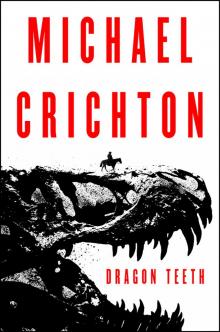 Dragon Teeth
Dragon Teeth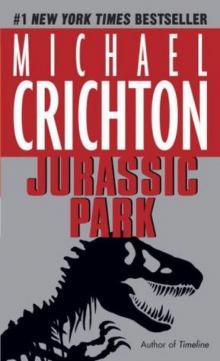 Jurassic Park
Jurassic Park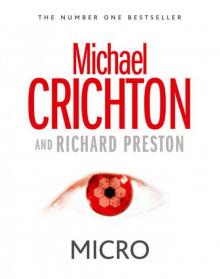 Micro
Micro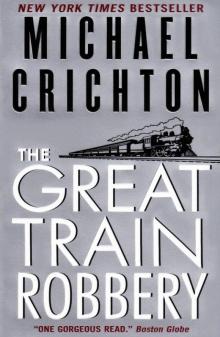 The Great Train Robbery
The Great Train Robbery The Andromeda Strain
The Andromeda Strain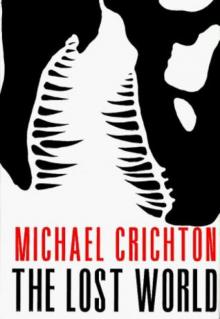 The Lost World
The Lost World Congo
Congo Travels
Travels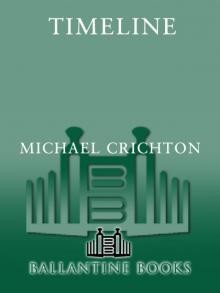 Timeline
Timeline Sphere
Sphere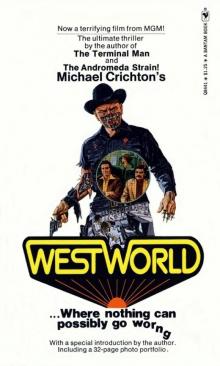 Westworld
Westworld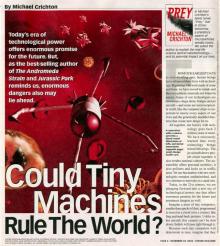 Prey
Prey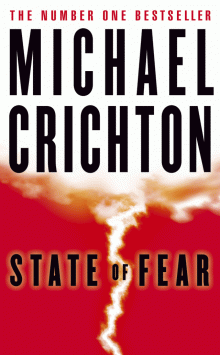 State Of Fear
State Of Fear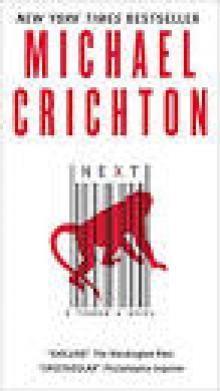 Next
Next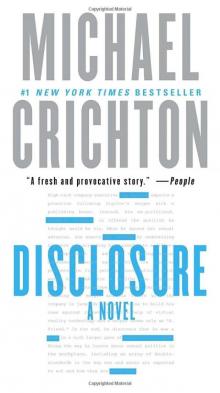 Disclosure
Disclosure Pirate Latitudes
Pirate Latitudes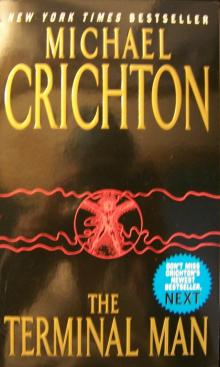 The Terminal Man
The Terminal Man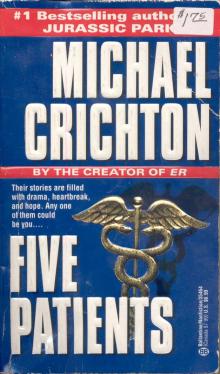 Five Patients
Five Patients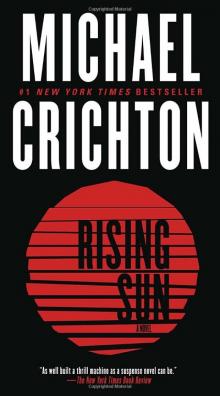 Rising Sun
Rising Sun Binary
Binary The Andromeda Evolution
The Andromeda Evolution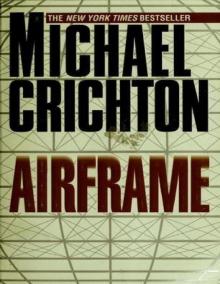 Airframe
Airframe Easy Go
Easy Go Drug of Choice
Drug of Choice Odds On: A Novel
Odds On: A Novel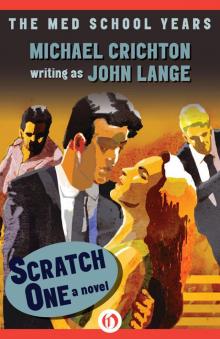 Scratch One
Scratch One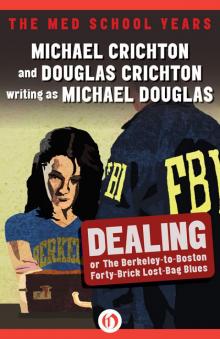 Dealing or The Berkeley-to-Boston Forty-Brick Lost-Bag Blues
Dealing or The Berkeley-to-Boston Forty-Brick Lost-Bag Blues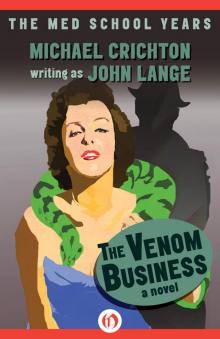 Venom Business
Venom Business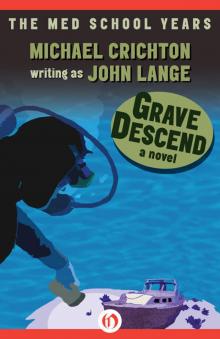 Grave Descend
Grave Descend Gold - Pirate Latitudes
Gold - Pirate Latitudes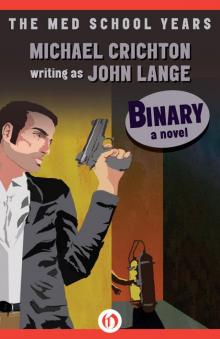 Binary: A Novel
Binary: A Novel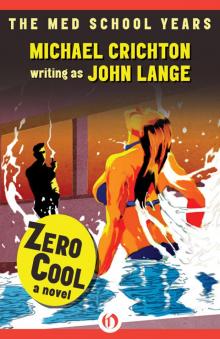 Zero Cool
Zero Cool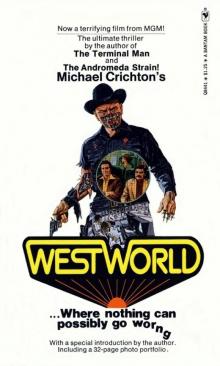 Delos 1 - Westworld
Delos 1 - Westworld